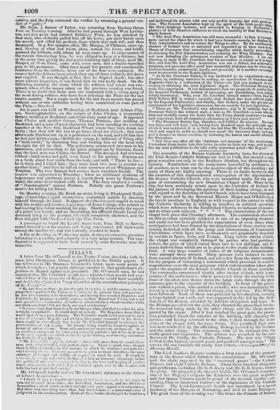IRELAND.
A letter from Mr. O'Connell to the Trades Union, dated the lath in- stant, from Darrynane Abbey, is published in the Dublin papers. It has reference to Mr. Sharman Crawford's letter, upon some points of
which it touehes ; but a more elaborate answer to that gentleman's ob- jections to Repeal agitation is promised. Mr. O'Connell says, he had .expected that Mr. Crawford would have admitted that events had con-
vinced him of the necessity of Repeal, or that he would have manfully and decidedly objected to any alteration of the centralization principle of the Union "—
e, He has done neither : he hal thought fit to tnhe a middle course ; he has altogether repudiated the Union as it exists in its present finan and pres‘mre ; he has also repudiated its dissolution; and having thus assailed Repealers and Unionists, he proposes a middle course, neither Repeal nor rnion, but a sad and speculative cmnbination of both—a wheel within a wheel—neither white nor black—neither ' fish nor flesh, nor good red-herring.' "it seems to me that there is only one thing certain, and that is—that his plan is totally inapplicable. It would content nobody. We Repealers deem that it woula operate as a pere delusion. The Unionists would never consent to such a first sh p towar.ls Itepf.al ; and whilst neither party consented to his device, there would be exceedinly few 'beside Mr. Cniwfbrd himself to advocate the practicability of ...add a plan. No human being would be fiedial to agitate hi favour of such a scheme. Your milk-and-water creates no excitement, it i3 an excel:est cote putout f c vour good motherly patriots ; but it has in it none of tle• rnov iogredients which excite the it.stirring, soul-moving animation 'for Fat arid Lib,rty. " Mr. Cre,O,rd's reply is, indeed, written with more than his usual clear- ness, and, %1 is better, with perket courte::y. There is much force, though there is little a novelty, in the manner hi which he combines awl puts for- ward his objections. la every ale,v,yr to I.: given to these objections the Sallie calmness of temper 9ffil c.pres,i,m must be used. It would be exceedittely areitg, and ,oa!!, ,T bins an immense advantage before the public, if arg,;:im.! b•• him in the torte and keepiag of g,ntle- manly demennome net si in WI:hoist:4 spirit, and in the nuanier and with the tact of poli,-letl :iociety."
Mr. O'Connell briefly notices Mr. Crawford's reference to the failure of defunct .,,OcictiOflS-
I thick it wal a specimen of tel tale to assail, in hi: reply to
you, the Geeersl As-oeedioe, the A nti-Tery Association, and the Precureor
Association ; ail of which merited and obthined your support and calperation. But there was something worse than had taste—there is a monstrous error of judgment hi his cendunuation, Each of these bodies discharged its functions, And perfonnedits mission with not only perfeCt honesty, but with groat Cess. The General Association kept up the spirit of the Irish people alita; the Grey-Anglesey tyranny, and succeeded in keeping in Parliament ; phalanx of Irish Members sufficient to check the hostility of that Ministry wards, Ireland.
" The Anti-Tory Association was still more successful: in fact, it triumph. antly carried the object for which it had been formed—namely, to displace the
Tory Administration and to restore the 'Whigs to office. By its exertions the electors of Ireland were so animated and orgauizea as to have sent to the Rouse of Commons that overwhelming majority which finally succeededis
overturning the Peel Administration anti restoring the Whig Ministry. Ike, not now defending the subsequent conduct of-that Ministry. I tun oas showing, in reply to Mr. Crawford, that his accusation is unjust as it is lithe, and that the Anti-Tory Association was not a failure, but achieved le purposes, and gave one other proof how irresistible Irishmen can be when thee combine honestly, numerously, legally, and peaceably. It is another mom*: ment to persevere in the Repeal agitation.
" As to the Precursor Society, It was instituted as an experiment—to try whether, by confining ourselves to seeking an equalization of franchise With
Eugland,--that is, a realization of the Union—we hail any prospect of sua ceeding in obtaining the most legitimate object. The Precursor Society tal made this experimeut. It has demonstrated that our prospects of justice.froa the Imperial Parliament, instead of increasing, are diminishing, and, inele,ed, totally terminated. Why., even Mr. Crawford himself admits—first, tint the Irish Reform Bill is unjust ; secondly that Ireland has been refused justice by the Imperial Parliament ; and thirdly, thnt Ireland, under the present cit. cumstances of her legislative connexion has no security for just legislation.
" These are Mr. Crawford's own admissions: and is it nothing that the Precursor Society has reduced such a man as Mr. Crawford—a man wheat. sires and candidly avows his desire that the Union should continue—to make such bnportant, such all-important, admissions as I have just stated?
" The Precursor Society has, therefore, well fulfilled its mission. Its work seas done, and well done : and, having been dissolved upon the principle 40a
which it was instituted, it is a little too bad that Mr. :Crawford, who was la. sited and. urged to assist us, should now assail the hononred dead,' and eq. gait a damper on future exertion, by traducing the honest and useful efforts of the Precursors.
'6 But thes, are, after all, the 'buckram and staytape ' of the controversy. I introduce these topics into this letter, in order to clear my way, and to C011. tine my next publication to the only really important point—the Repeal."


























 Previous page
Previous page